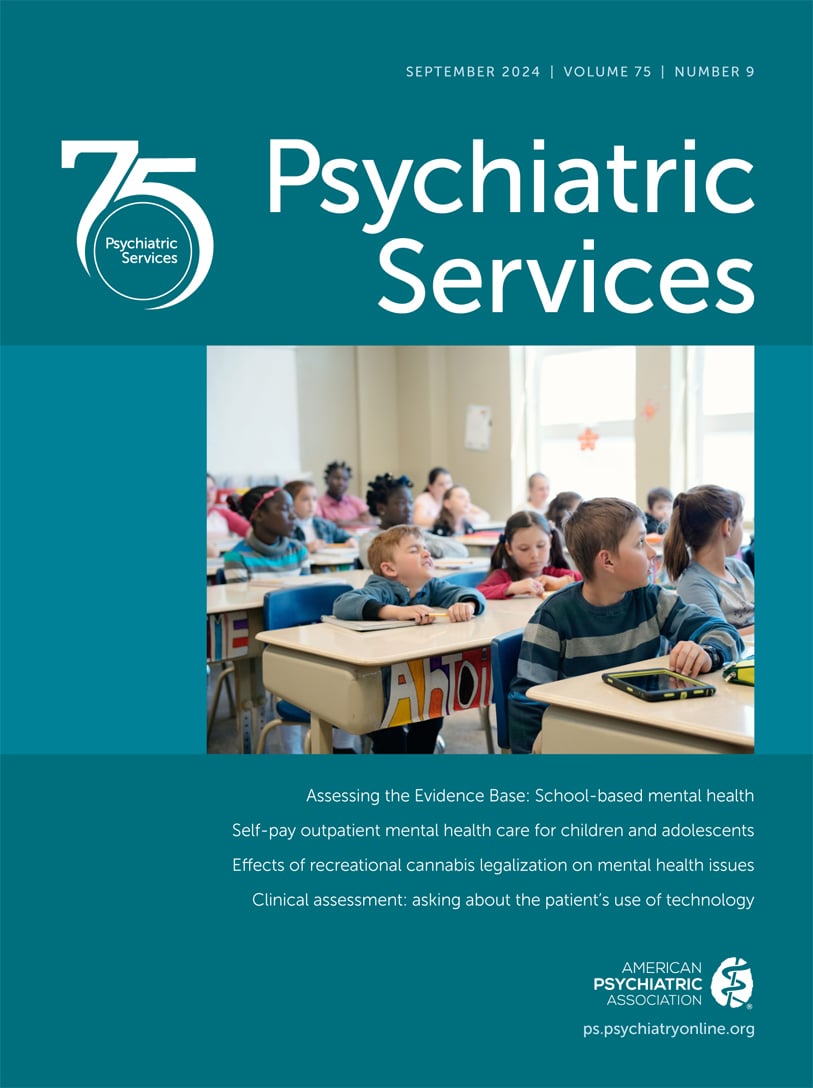Psychiatric Services
- Volume 63
- Number 1
- January 2012
Law & Psychiatry
Publication date: 01 January 2012
Pages1–9Certain groups with preexisting mental and behavioral health conditions, such as substance use disorders, may be especially vulnerable during and shortly after disasters. Researchers have found that substance abuse treatment programs and the individuals ...
https://doi.org/10.1176/appi.ps.2012000p7Taking Issue
This Month's Highlights
Columns
Publication date: 01 January 2012
Pages10–12The authors report a process evaluation that used rigorous qualitative methods consistent with best practice to assess the development and impact of a nascent recovery center in the New York City area. The center successfully delivered services that ...
https://doi.org/10.1176/appi.ps.201200p10Articles
Publication date: 01 January 2012
Pages13–18From 1993 to 2003, spending on medications was a major factor in unprecedented growth in mental health spending. An analysis of current trends shows that past high growth in spending on psychiatric drugs has slowed substantially—from an average annual ...
https://doi.org/10.1176/appi.ps.201100564Publication date: 01 January 2012
Pages19–25Objective: Despite growing interest in the use of evidence-based treatment practices for treating substance use disorders, adoption of medications by treatment programs remains modest. Drawing on resource dependence and institutional theory, this study ...
https://doi.org/10.1176/appi.ps.201100034Publication date: 01 January 2012
Pages26–32Objective: Incarceration of people with mental illness has become a major social, clinical, and economic concern, with an estimated 2.1 million incarcerations in 2007. Prior studies have primarily focused on mental illness rates among incarcerated persons. ...
https://doi.org/10.1176/appi.ps.201000505Publication date: 01 January 2012
Pages33–39Objective: This study sought to determine the prevalence of criminal justice involvement during episodes of mania and to identify whether specific manic symptoms contribute to this risk. Methods: Data from the 2001–2002 National Epidemiologic Survey on ...
https://doi.org/10.1176/appi.ps.201100174Publication date: 01 January 2012
Pages40–47Objective: The main objective of this study was to learn more about what increases or decreases the likelihood of patient conflict (such as verbal abuse, violence, and rule breaking) and containment (such as seclusion, manual restraint, and enforced ...
https://doi.org/10.1176/appi.ps.201000480Publication date: 01 January 2012
Pages48–53Objectives: The authors describe the development of the Maryland Assessment of Recovery in People with Serious Mental Illness, or MARS, a 25-item self-report instrument that measures recovery of people with serious mental illness, and report a study of its ...
https://doi.org/10.1176/appi.ps.201100109Publication date: 01 January 2012
Pages54–60Objective: Research on the effectiveness of peer-run services on the recovery of people with major psychiatric problems has been limited and poorly controlled. This study evaluated the effects of a 12-week peer-run course on recovery, “Recovery Is Up to ...
https://doi.org/10.1176/appi.ps.201000450Publication date: 01 January 2012
Pages61–65Do consumer-run mental health centers have a special capacity to promote recovery principles among peers with mental illness? By strengthening social integration and fostering a culture of accountability and reciprocity between peers, such programs help ...
https://doi.org/10.1176/appi.ps.201000512Publication date: 01 January 2012
Pages66–72Objective: It is unclear why late-life mood and anxiety disorders are highly undertreated, despite being common among older adults. Thus this study examined prevalence of and key factors associated with nonuse of mental health services among older ...
https://doi.org/10.1176/appi.ps.201100121Publication date: 01 January 2012
Pages73–78Objective: The delivery of psychiatric services may be affected by clinicians' negative reactions to treatment-resistant or stigmatized patient groups. Some research has found that clinicians across professional disciplines react negatively to patients ...
https://doi.org/10.1176/appi.ps.201100050Open Forum
Publication date: 01 January 2012
Pages79–82Public service announcements (PSAs) play a key role in public education campaigns designed to eliminate stigma associated with mental illness. However, a review of the research literature found very few studies of the effectiveness of U.S. antistigma ...
https://doi.org/10.1176/appi.ps.201100460Brief Reports
Publication date: 01 January 2012
Pages83–86Objective: The authors examined trends in the use of second-generation antipsychotics for treatment of bipolar disorder before and after the U.S. Food and Drug Administration's approval in 2000 of olanzapine for use in treating acute manic episodes of ...
https://doi.org/10.1176/appi.ps.201100092Publication date: 01 January 2012
Pages87–90Objective: Relapse and its predictors were examined among patients with schizophrenia in the year after hospital discharge. Methods: The sample included 200 patients with schizophrenia participating in a German multicenter study. Relapse was defined as a ...
https://doi.org/10.1176/appi.ps.201100084Publication date: 01 January 2012
Pages91–93Objective: Measurement-based care has been endorsed but not embraced in mental health settings. There is currently little guidance regarding the best methods to implement measurement-based care. Methods: A survey of mental health providers was conducted ...
https://doi.org/10.1176/appi.ps.201100323Frontline Reports
News & Notes
Past Issues
View Issues Archive
Vol. 75 | No. 12

Vol. 75 | No. 11

Vol. 75 | No. 10
